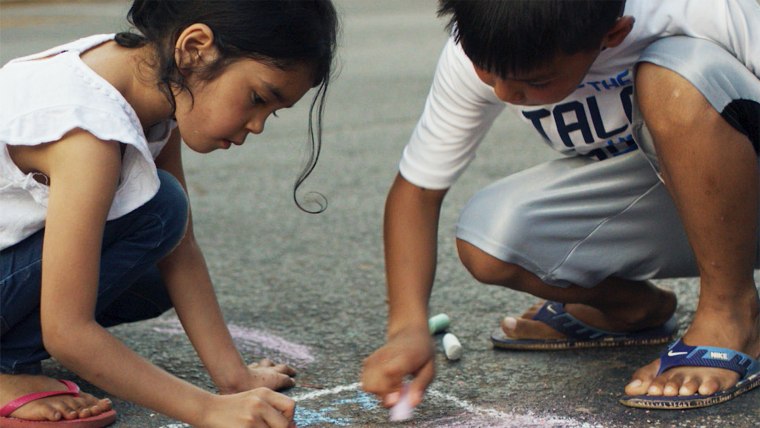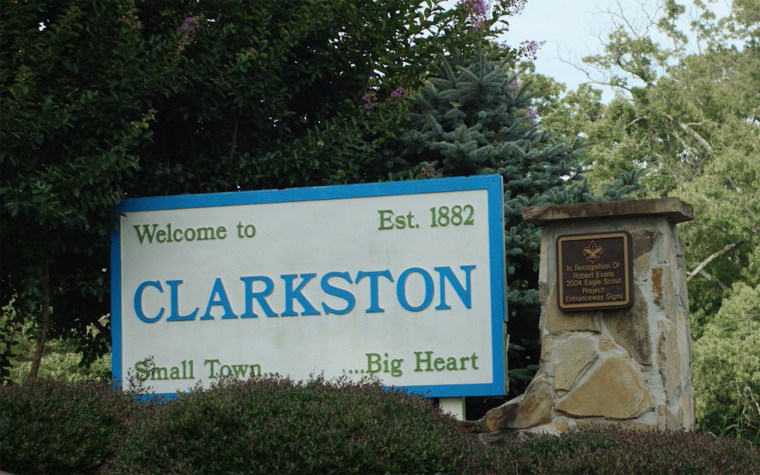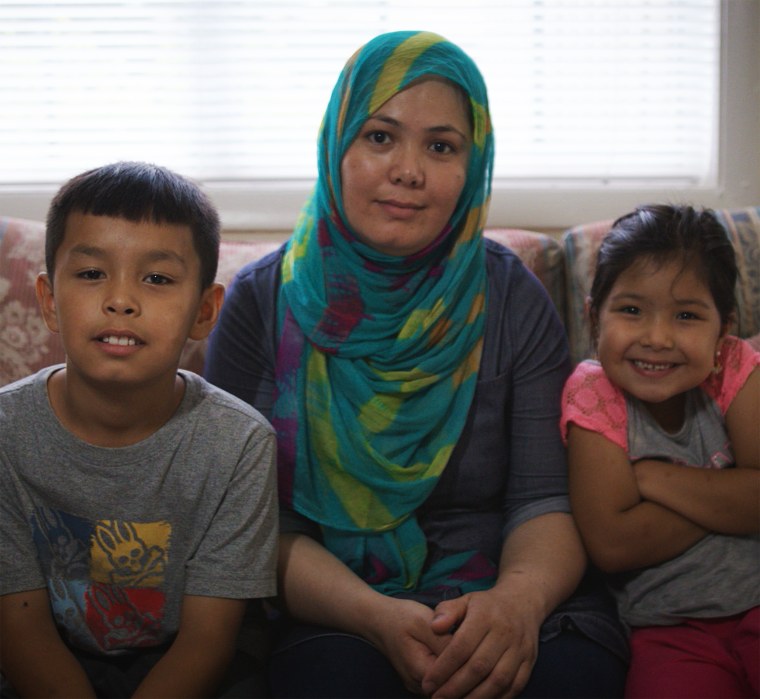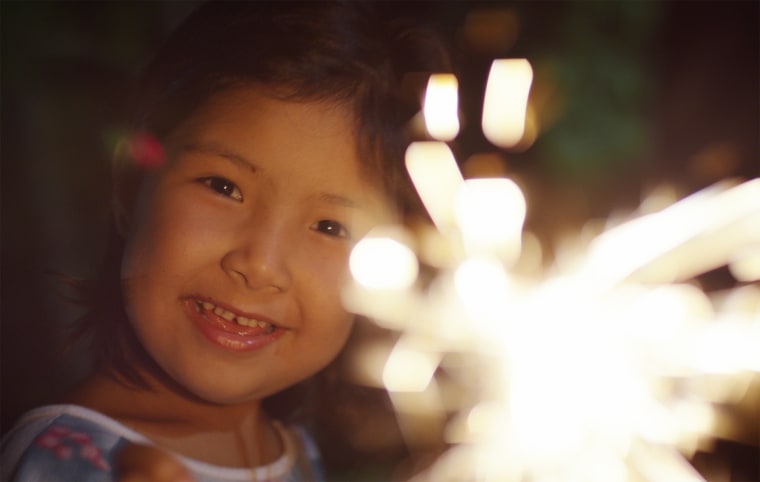The city of Clarkston has a celebration planned for July Fourth, complete with a community pool party, hot dogs on the grill and sparklers for the kids.
It sounds like a scene from thousands of small towns across the country, but the holiday has a particular poignancy for many of the 13,000 residents in the small Georgia city, 31.8 percent of whom were not born in the U.S.
The celebration will mark a joyous day for people like Maryam Ahmad Jan, 29, a single mother who escaped a dangerous situation in her native Afghanistan with her young son and daughter in February to settle in the town located just east of Atlanta.
The fear she felt getting off the plane with her children has been replaced by hope for a better future.
“Compared to the past, living in America is much different," Jan told TODAY through an interpreter. “I see my children. I see smiles on their faces. I see lots of changes in my daily life. I see them happy, and I’m extremely happy.”
Clarkston has become what mayor Ted Terry calls the "Ellis Island of the South," a destination for international refugees that packs 40 nationalities speaking 60 languages into the town’s 1.4 square miles.
Amid angry rhetoric about immigration policies in America, Terry, 35, believes Clarkston shines as an example of how a diverse group of people can live together and make it work.
“It really gives me a lot of hope in a future world because if … we can find this pathway to show that you can have a peaceful, more prosperous world, then I think that we could really see that take hold in a lot of other parts of America and it will be something that we are proud that we were part of," Terry told TODAY.

A stroll through the pedestrian-friendly town takes visitors past mosques, Buddhist temples, Christian churches and restaurants like the Kathmandu Kitchen & Grill and an Ethiopan café.
“These are individuals and families, just like me and you, that … really have the same motivations, the same fears, the same pain, the same need to provide for their family as we do," Paedia Mixon, CEO of nonprofit resettlement organization New American Pathways, told TODAY.
They are people who are fleeing genocide or war, people who have been tortured, imprisoned for their beliefs or skin color, or had family members killed — people like Jan, who couldn't talk specifically about her plight out of fear it could endanger family still living in Afghanistan.
“We have passed through a lot of difficulties, me and my children, that we should not have," Jan told TODAY through interpreter Abdul Haikal. “And I want to put myself in any kind of situation to support and take care of my children.”
Jan’s adjustment to America has been assisted by New American Pathways, which works with the U.S. government to facilitate housing, employment, English lessons and more for recently arrived refugees.

Refugees are given six months of government assistance by resettlement programs, but New American Pathways aims to help them beyond that time frame to help them find success going forward. A skilled weaver, Jan has already found work as she aims to adjust to her family’s new life in Clarkston.
“Maryam has been an inspiration to me," said Mary Martha Myette, a Clarkston resident who is co-sponsoring Jan and her family through New American Pathways.
“She is a woman who has quiet grace. She is very strong, she’s hardworking, she’s an amazing person. We consider each other as family.”
Jan is hoping to follow in the footsteps of Haikal, who came to Clarkston with his wife and son from Afghanistan on a special immigrant visa in 2012. He was working with U.S. military in Afghanistan and had to flee due to a security situation.
Haikal recently became a U.S. citizen and works with New American Pathways to help pave the way for those who have come to Clarkston after him.
“America is the land of opportunity, a country that knows the worth of being a human, that knows the rights of being a human," he said. “I will be able to take care of my family in America.”
A Changing City
Clarkston grew as a stop on the Georgia Railroad in the late 1800s, and had a majority white population until many began leaving for the suburbs in the 1970s.
The city started to become a refugee destination in the 1980s, when people fleeing from Vietnam and other repressive Southeast Asian countries began arriving.
“A lot of leaders and fearmongers from that time were saying, ‘We can't take Vietnamese refugees because the communists could infiltrate the ranks and spread communism," Terry said. “It turned out to be one of best decisions we made, as many of our business leaders and officials are now first- or second-generation Americans from that time who bring a lot to the community.”

“There’s a lot of rhetoric out there that’s dehumanizing," Mixon said. “The idea of we versus them, us versus them, is a very antiquated idea. I think we are all cut from the same cloth. We all deserve dignity and to be treated with compassion.”
In the past 25 years, Georgia has resettled 37,000 refugees — a majority of whom have come through Clarkston — with an average of about 2,500 to 3,500 each year, statewide. There are currently an estimated 23 million refugees and an unprecedented 65 million people dislocated from their homes in the world, according to the United Nations High Commissioner for Refugees.
However, the number of refugees entering the U.S. has dipped dramatically since last year. Executive orders by President Donald Trump put a cap on the total amount of refugees the country will accept, and banned anyone entering from seven countries — five with Muslim majorities.
Trump set the limit at 45,000 refugees for 2018, the lowest ceiling since presidents began setting the limit on refugee admissions in 1980. Georgia is expected to resettle about 1,000 refugees this year, according to Mixon.
Making It Work
Clarkston is in DeKalb County, a blue swath in a red state where Gov. Nathan Deal, a Republican, issued a 2015 executive order to ban Syrian refugees that he later rescinded.
Add in Georgia’s troubled history with race, and Clarkston appears to be an unlikely place to regularly take in refugees. So how does the city make it work?
“The way people look at Southern culture, you could look at it and see why refugees wouldn’t be welcome, but you could also look at it as ours is a culture of hospitality, ours is a culture of faith, and that’s really been a big part of the refugee program," Mixon said.
Mixon has been working with refugees in Clarkston for 20 years and notes that relations between the existing community and refugees have had their rough patches. There has been much more coordination between refugee resettlement organizations and city government in recent years, which has helped reduce friction, Mixon said.
Terry also cites the town’s small size and population density as factors that allow newly arrived refugees to acclimate successfully. Everything in the city is in walking distance, and public transportation is readily available for refugees who often work at factories an hour away.
“This is a great place to start off in America," Jan said. “It’s diversified. There are people from all over the world. It’s very accepting.”

The city also offers affordable apartment housing, English classes, a variety of places of worship, and local businesses catering to refugee needs.
The new arrivals, who typically have already spent eight to 10 years in a refugee camp or dislocated from home, also usually have a skill that can help them find employment quickly. Eighty-nine percent of the refugees are self-sufficient within six months and not dependent on government aid, Terry said.
“We get people from places like Iraq, Afghanistan and Congo who have these amazing skill sets," Terry said. “They're some of the most resilient people in the world. They’ve been through hell and back, and they survived. They are also willing to do jobs that Americans won't do, so that they know their children will have opportunities.”
The existing infrastructure of refugee and faith-based organizations is also crucial to the town’s ability to absorb so many newcomers. Another important factor is a welcoming population that includes people like Myette, the woman co-sponsoring Jan’s family.
"The fear that (Jan) had, although she was very well-composed, she was very afraid (at first),'' Myette said. "And then to see her after her first day at work, the smile on her face — the difference in the photographs is just amazing to see.”
Clarkston was named one of Georgia’s 50 safest cities with populations over 10,000 by the National Council for Home Safety and Security, which uses the most recent crime data from the FBI as well as population statistics and internal research.
There are still areas for improvement, as the poverty rate is 35.6 percent, nearly three times the national average, according to the U.S. Census Bureau.
“Working with refugees isn’t charity," Mixon said. “It’s an investment in people who bring really important skills to America. I think one of the things that we don’t think about is how important that resourcefulness and optimism has been in building this country and building our culture and making America thrive.”
When the citizens of Clarkston gather for the July Fourth party on Wednesday, holding their sparklers and celebrating the quintessential American holiday, they won’t be Bhutanese or Ethiopian or Sudanese. They will be Georgians celebrating a country that has given their lives hope.
“Let’s be one nation, one America, living under one great flag," Haikal said.
Follow TODAY.com writer Scott Stump on Twitter.